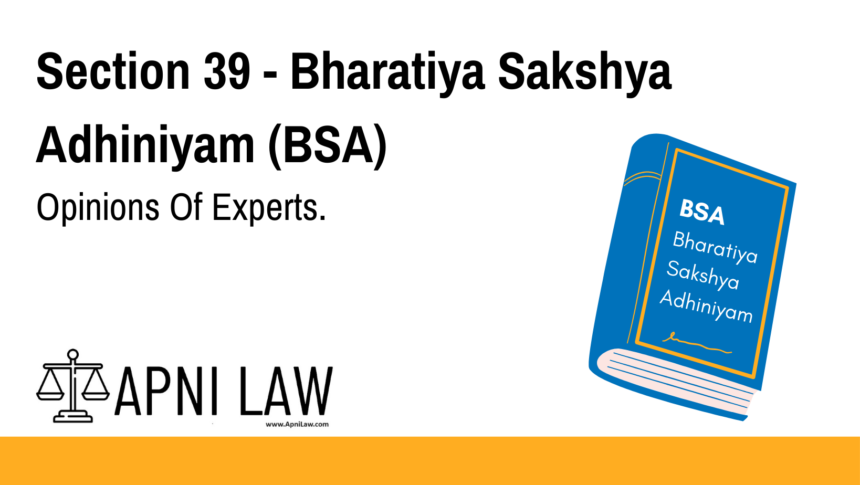Code
(1) When the Court has to form an opinion upon a point of foreign law or of
science or art, or any other field, or as to identity of handwriting or finger impressions, the
opinions upon that point of persons specially skilled in such foreign law, science or art, or
any other field, or in questions as to identity of handwriting or finger impressions are
relevant facts and such persons are called experts.
Illustrations.
(a) The question is, whether the death of A was caused by poison. The opinions of
experts as to the symptoms produced by the poison by which A is supposed to have died,
are relevant.
(b) The question is, whether A, at the time of doing a certain act, was, by reason of
unsoundness of mind, incapable of knowing the nature of the act, or that he was doing what
was either wrong or contrary to law. The opinions of experts upon the question whether the
symptoms exhibited by A commonly show unsoundness of mind, and whether such
unsoundness of mind usually renders persons incapable of knowing the nature of the acts
which they do, or of knowing that what they do is either wrong or contrary to law, are
relevant.
(c) The question is, whether a certain document was written by A. Another document
is produced which is proved or admitted to have been written by A. The opinions of experts
on the question whether the two documents were written by the same person or by different
persons, are relevant.
(2) When in a proceeding, the court has to form an opinion on any matter relating to
any information transmitted or stored in any computer resource or any other electronic or
digital form, the opinion of the Examiner of Electronic Evidence referred to in section 79A of
the Information Technology Act, 2000, is a relevant fact.
Explanation.—For the purposes of this sub-section, an Examiner of Electronic Evidence
shall be an expert.
Explanation
Section 39 of the BSA recognizes the admissibility of expert opinions as relevant facts in legal proceedings. It includes two major components:
Subsection (1): Expert Opinion in Traditional Fields
This part allows expert opinions in:
- Foreign Law
- Science or Art
- Handwriting and Fingerprint Analysis
- Any other specialized field
Experts are individuals with special skill, training, or experience in these domains, and their opinions help the court understand technical matters.
Subsection (2): Expert Opinion in Electronic Evidence
Recognizes the role of an “Examiner of Electronic Evidence” under Section 79A of the IT Act, 2000. The opinion of such an examiner is admissible and considered that of an expert.
Illustrations
- (a) A dies due to suspected poisoning → A toxicologist’s opinion on poison symptoms is relevant.
- (b) A is accused of a crime → A psychiatrist’s opinion on mental illness and capacity is relevant.
- (c) Forgery case → A handwriting expert compares known and questioned documents.
Common Questions and Answers
1. Who qualifies as an expert under this section?
Any person with special knowledge, skill, or training in a particular field relevant to the case.
2. Are expert opinions binding on the court?
No, they are relevant and assist the court, but the judge is not bound to accept them blindly.
3. What is the role of an Examiner of Electronic Evidence?
They assess and provide opinions on digital/electronic evidence. Their opinions are considered expert testimony under this section.








